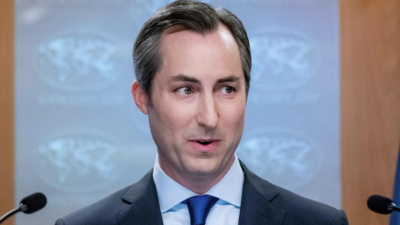Cross-Border Assassinations
The United States has issued a plea to India and Pakistan to avoid any escalatory actions following recent reports of cross-border assassinations allegedly carried out by Indian agents inside Pakistani territory.
During a press briefing, State Department Spokesperson Matthew Miller addressed these concerns, emphasizing the importance of dialogue in resolving such serious issues.
In his statement, Miller articulated the U.S. stance on the delicate situation. “The United States is not going to get in the – into the middle of this, but we do encourage both India and Pakistan to avoid escalation and find a resolution through dialogue,” he explained.
This call for restraint reflects the U.S. government’s broader strategy to encourage peaceful relations and dialogue between the two nuclear-armed neighbors, who have a long history of tense relations and conflict over various issues including the disputed territory of Kashmir.
Miller was cautious not to take sides or provide any explicit endorsement of the claims made by either country regarding the assassinations.
Instead, he reiterated the U.S. commitment to encouraging a peaceful, diplomatic path forward, underscoring that any resolution should come directly from the parties involved.
When pressed about the potential for the United States to impose sanctions on Indian individuals allegedly involved in the assassinations, Miller maintained a reserved stance.
“So I am never going to preview any sanctions actions, which is not to say that there are any coming, but when you ask me to talk about sanctions, it’s something that we don’t discuss openly,” he stated.
This comment highlights the often sensitive and confidential nature of U.S. sanctions policies, which are typically not disclosed publicly ahead of their formal announcement.
The implication of Miller’s statements is clear: while the United States remains a key player in global diplomacy and maintains a vested interest in the stability of South Asia, it prefers to support a resolution through diplomatic channels rather than through unilateral actions such as sanctions.
This approach is indicative of a broader U.S. foreign policy that seeks to balance strategic interests with a commitment to international norms and dialogue-based conflict resolution.
Overall, the U.S. continues to monitor the situation closely, urging both India and Pakistan to engage in meaningful dialogue to address and resolve issues that have potential regional and international ramifications.
I am a dynamic professional, specializing in Peace and Conflict Studies, Conflict Management and Resolution, and International Relations. My expertise is particularly focused on South Asian Conflicts and the intricacies of the Indian Ocean and Asia Pacific Politics. With my skills as a Content Writer, I serve as a bridge between academia and the public, translating complex global issues into accessible narratives. My passion for fostering understanding and cooperation on the national and international stage drives me to make meaningful contributions to peace and global discourse.










